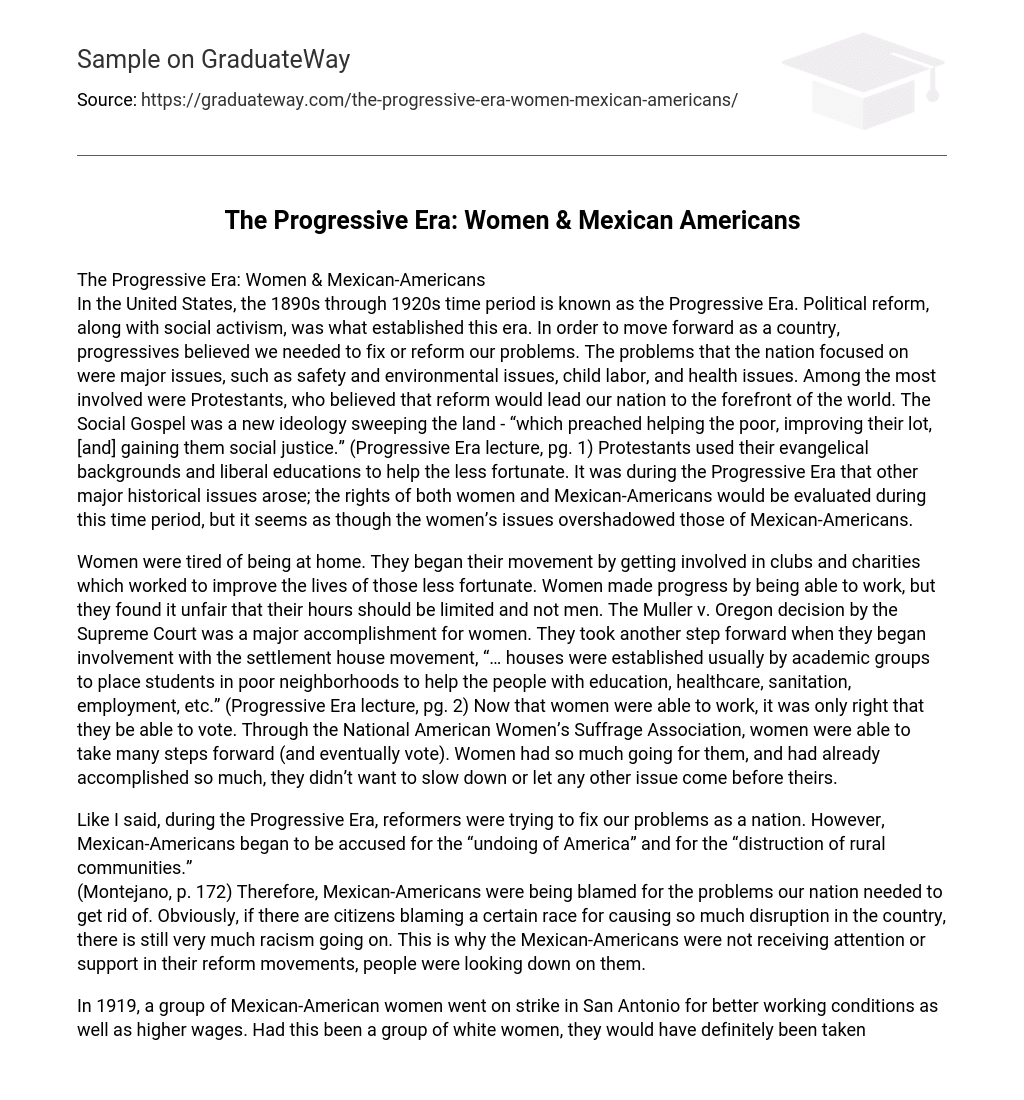The Progressive Era: Women & Mexican-Americans
In the United States, the 1890s through 1920s time period is known as the Progressive Era. Political reform, along with social activism, was what established this era. In order to move forward as a country, progressives believed we needed to fix or reform our problems. The problems that the nation focused on were major issues, such as safety and environmental issues, child labor, and health issues. Among the most involved were Protestants, who believed that reform would lead our nation to the forefront of the world. The Social Gospel was a new ideology sweeping the land – “which preached helping the poor, improving their lot, [and] gaining them social justice.” (Progressive Era lecture, pg. 1) Protestants used their evangelical backgrounds and liberal educations to help the less fortunate. It was during the Progressive Era that other major historical issues arose; the rights of both women and Mexican-Americans would be evaluated during this time period, but it seems as though the women’s issues overshadowed those of Mexican-Americans.
Women were tired of being at home. They began their movement by getting involved in clubs and charities which worked to improve the lives of those less fortunate. Women made progress by being able to work, but they found it unfair that their hours should be limited and not men. The Muller v. Oregon decision by the Supreme Court was a major accomplishment for women. They took another step forward when they began involvement with the settlement house movement, “… houses were established usually by academic groups to place students in poor neighborhoods to help the people with education, healthcare, sanitation, employment, etc.” (Progressive Era lecture, pg. 2) Now that women were able to work, it was only right that they be able to vote. Through the National American Women’s Suffrage Association, women were able to take many steps forward (and eventually vote). Women had so much going for them, and had already accomplished so much, they didn’t want to slow down or let any other issue come before theirs.
Like I said, during the Progressive Era, reformers were trying to fix our problems as a nation. However, Mexican-Americans began to be accused for the “undoing of America” and for the “distruction of rural communities.”
(Montejano, p. 172) Therefore, Mexican-Americans were being blamed for the problems our nation needed to get rid of. Obviously, if there are citizens blaming a certain race for causing so much disruption in the country, there is still very much racism going on. This is why the Mexican-Americans were not receiving attention or support in their reform movements, people were looking down on them.
In 1919, a group of Mexican-American women went on strike in San Antonio for better working conditions as well as higher wages. Had this been a group of white women, they would have definitely been taken more seriously. Mexican-Americans, along with blacks, were in a really bad place because the individuals with the most compassion who usually helped them out were almost always women. However, with the women being preoccupied with their own reform issues, there was not many to advocate for minorities and their rights and problems.
In Montejano’s reading, it is said that the “… Mexican problem had nothing to do with integration or assimilation”. (Montejano, p. 174) Basically, the reason for this is because Mexican-Americans were accused of all of these problems, yet they always were minding their own business. It seems as though, just like in today’s society, the blame had to be put on someone. Mexican-Americans could be blamed because all they did was agricultural labor. “Agricultural labor became defined as “Mexican Work””. (Montejano, p. 180) Why not put the blame on someone who you feel has no means of defending themselves?





